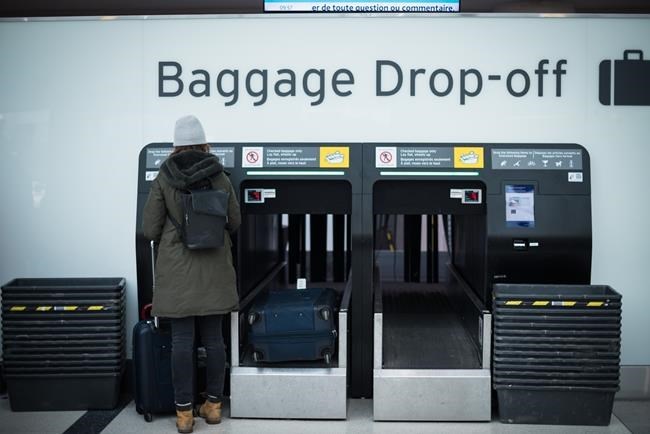On July 8, Aaliyah Corbin landed at Toronto's Pearson International Airport after a fun and relaxing vacation with friends in Portugal. The good times quickly ended, however, when her luggage was nowhere to be found.
Instead, she discovered an airport employee had accidentally attached her bag tag to her friend’s luggage. Among the four friends she was travelling with, Corbin’s was the only bag lost. To make matters worse, this was the day that Rogers had a network outage, so it felt extra chaotic at the airport, the 26-year-old said.
“I was very emotional and very upset to walk into such a disorganized disaster. It felt overwhelming … All I could do was think about the belongings that were memorable to me.”
Reports about delayed and lost baggage have been making headlines alongside news of cancelled or postponed flights. Last month, an Ipsos poll conducted on behalf of Global News, revealed that 58 per cent of Canadians are avoiding airports until the situation improves and 70 per cent call the problems an embarrassment to Canada.
“There’s a lot of chaos around the world with regards to travelling as people are picking it up after a few years of not travelling,” said Natasha Macmillan, director of everyday banking at Ratehub.ca, an online platform that compares financial products.
A credit card with delayed baggage insurance can help if your checked bag doesn’t arrive at your destination on schedule. You can be reimbursed for some or all of the costs of essential items, such as clothing and basic toiletries, that you need to purchase in the meantime, Macmillan said.
You might also be eligible to be reimbursed for a certain amount of your personal belongings. Coverage varies between cards and can extend to a spouse and any depending children travelling with you.
Cardholders will want to read the terms and conditions of any credit card they choose carefully, because there can be exclusions such as losses when returning home to your province or territory or for unchecked luggage, Macmillan said, and certain items such as prescription glasses, sporting equipment and cameras may not be covered.
Since Canadians can buy travel insurance on their own, it’s worth weighing whether a credit card with these types of insurance is needed.
According to Barry Choi, a personal finance and travel expert in Toronto, it all comes down to costs.
“A typical travel insurance policy that comes with medical and extended coverage — including delayed and lost baggage and trip delay insurance — can cost about $300 a year. This would cover you for an unlimited number of trips for about two weeks of consecutive travel at a time,” he said.
“Credit card travel insurance can offer similar polices while their annual fees may only be $120 to $250 a year. Now if you only travel once a year for a short period, it may be cheaper to just buy a separate travel insurance policy as needed.”
In Corbin’s case, she went with insurance through a travel agent. It covered up to $1,500 but since her luggage and belongings were worth closer to $2,500 she decided to wait for the airline rather than putting in a claim in the hope of recouping the full amount and more for the hassle.
Both Choi and Macmillan recommend the TD Aeroplan Visa Infinite card for those looking for a credit card with travel insurance. The annual fee is $139 per year, but it’s typically waived the first year, Choi said. The card also has Air Canada benefits, such as the ability to check your first bag for free.
Choi also recommended The American Express Gold Rewards Card, which has an annual fee of $250, and Macmillan suggested the American Express Cobalt Card, which has a monthly fee of $12.99. All of these cards allow users to collect points that can go toward travel.
Choi warns to keep in mind that there are specific conditions to qualify for credit card insurance. Usually, cards require that you charge a certain percentage, and sometimes the entire amount, of your flights for baggage insurance to apply. If you’re paying partially with points, the conditions might be even more strict.
It’s also important to note that getting a credit card with travel insurance doesn’t always mean you’ll get to bypass dealing with the airline.
“Some credit card providers will only cover you for the portion of the replacement cost of lost personal property that is not paid by the common carrier or other insurance,” Macmillan said.
“So, while it’s a valuable insurance to have, it may not allow you to entirely avoid filing a claim with the common carrier.”
In a response to a request for comment about Corbin's case, a spokesperson for Air Transat said, “the operational issues currently affecting baggage handling service providers at several airports are unfortunately impacting some of our clients’ travel experience. Regarding this specific case, we are doing everything in our power to find the client’s luggage and sincerely apologize for the inconvenience.
"We have sent all the information about her luggage, including photos, to both Lisbon and Toronto airports, which send us regular updates. We are also in contact with the client directly to inform her of available recourses.”
Shortly after The Canadian Press contacted Air Transat about Corbin's case, Corbin received a reply to an email she had sent inquiring about next steps. The email stated if she shared the contents of her bag, Air Transat would be “happy to compensate.” Since it’s been more than 30 days, she is entitled to claim the content of her baggage, though the airline tracing is still occurring and her baggage will be sent to her once it’s found.
This report by The Canadian Press was first published Aug. 8, 2022.
Leah Golob, The Canadian Press



